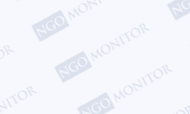Press Release:
NGO Monitor Calls on New Israel Fund to Draw Red Lines
JERUSALEM – The research and watchdog group NGO Monitor today called on the New Israel Fund (NIF) to implement clear “red lines” regarding the activities and rhetoric of the non-governmental organizations (NGOs) that it funds. NIF has been widely criticized for supporting advocacy groups that contribute centrally to demonization through allegations of “war crimes” and intense lobbying on behalf of the Goldstone Report.
“Instead of using its relationship with NGOs to advance constructive agendas, NIF has been supporting and defending campaigns that demonize and delegitimize Israel,” charged Prof. Gerald Steinberg, president of NGO Monitor. “In many cases, it appears that NIF donors are unaware of the activities of these groups and their damaging impact. It is essential that powerful organizations like NIF establish clear guidelines and implement them in an unequivocal and transparent manner.”
NGO Monitor proposes that NIF adopt “red lines” that prevent funding for organizations that support activities designed to promote the NGO “Durban strategy” to isolate Israel:
- BDS: Boycotts, divestment, and sanctions (BDS) campaigns.
- Demonization and delegitimization: Expressions including “apartheid,” Nazi rhetoric, “war crimes,” and deliberate misrepresentations of international law, as well as the use of UN frameworks for these goals.
- Lawfare: Legal threats or activities in courts outside Israel directed against Israeli officials, “Zionist” or “parastatal” groups, or companies that do business in Israel.
- Anti-Zionism: Opposition to the definition of Israel as a “Jewish and democratic state,” including demands for a “one-state solution,” the revocation of the Law of Return, and the elimination of national Jewish symbols.
“For an organization that claims that ‘our supporters love Israel,’ these red lines should be self-evident,” said Steinberg.

